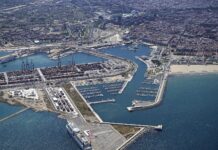
Shahid Rajaee port received a cyberattack on 9 May, which led to its computer systems disruption causing serious transport difficulties to shipping traffic, according to international news agencies.
Iran’s Ports and Maritime Organization (PMO) confirmed the attack with the country’s deputy minister of roads and urban development, Mohammad Rastad, revealing the details of the cyberattack on Iran’s major container port.

Speaking to Iranian Labour News Agency (ILNA), Rastad stated that the cyber-attack failed to penetrate the PMO’s systems and was only able to infiltrate and damage a number of private operating systems at the ports.
“The organisation is well protected, but still needs to continuously strengthen and update the layers of protection to minimise the risk of a cyber-attack,” he added.
According to western media reports, there was “total disarray” at the port, while the attack was described as “highly accurate”.
Iran’s deputy minister said he did not have any information about the origin of the cyber-attack on 11 May.
However, The Washington Post report on 19 May claimed that Israel was behind this attack, responding to the incident on 24 April, when Iranian hackers had halted the operation of a pump at a municipal water system in the Sharon region of central Israel.
It is not the first time that the two countries have been involved in such cases. Each country has accused the other of similar actions in the past.
Prime Minister of Israel, Benjamin Netanyahu, said in 2019 that Iran was making attempts to penetrate Israel’s computer networks, while Iran has accused the US and Israel of the “Stuxnet” attack, an attempt to disrupt the country’s nuclear programme. Neither country officially admitted the allegations.








